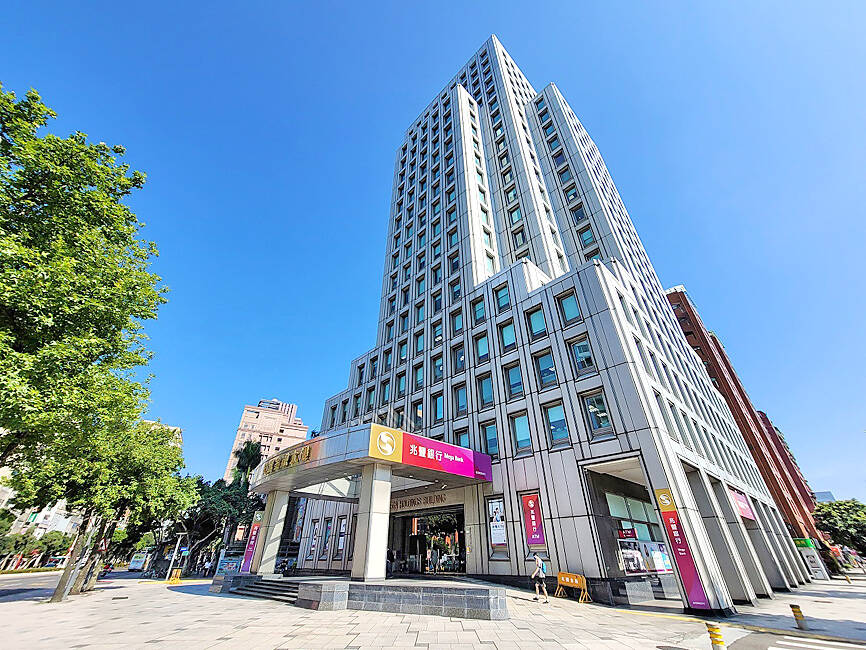State-run Mega Financial Holding Co (兆豐金控) yesterday said its four US branches position the company to capitalize on opportunities linked to Taiwanese technology firms’ investments in the US.
“The group’s main profit driver, Mega International Commercial Bank (兆豐銀行), is in the best position to seize upon business opportunities arising from US-bound investments from local electronics firms,” Mega Financial president Hsiao Yu-mei (蕭玉美) told at an online earnings conference.
The lender, which specializes in international financing, would serve local customers by leveraging its long-established branches in New York, Los Angeles, Chicago and California’s Silicon Valley, Hsiao said, after Taiwan Semiconductor Manufacturing Co (TSMC, 台積電) last week announced plans to invest an additional US$100 billion in the US.

Photo courtesy of Mega Financial Holding Co
Local firms in TSMC’s supply chain are expected to follow suit to better serve their customers’ operations in the US.
Mega Bank can provide a full range of overseas financial services, Hsiao said.
The company said it is eyeing loan growth aligning with Taiwan’s expected GDP growth of 2.5 to 3.42 percent.
Toward that goal, the lender would tap corporate lending opportunities, green energy financing projects and syndicated loan services, it said, adding that the bank also plans to bolster its foreign currency operations.
At the same time, Mega Bank would deepen inclusive financing by offering loans to urban renewal projects, while enhancing digital services for small and medium-sized enterprises, it said.
The bank would also capitalize on green energy financing, and extend loans to micro businesses and young entrepreneurs, it said.
With an ongoing slowdown in its mortgage operations following central bank credit controls, Mega Bank would shift its focus to other consumer banking needs secured by real estate, it said.
Although the housing market is cooling, steady employment and rising wages would keep consumer spending and credit demand resilient, Mega Financial said.
Mega Bank’s net interest margin would improve if US dollar loan demand picks up — which could happen if the US Federal Reserve lowers interest rates by 25 to 50 basis points later this year as expected, the company said.
Taiwan’s central bank is likely to keep interest rates unchanged in light of stable economic growth and benign inflation below 2 percent, the company said.
Mega Bank reported strong loan growth last year, driven by the housing market and Taiwan’s stable economy.
Mortgage lending increased 11 percent from a year earlier, faster than overall loan growth of 7.9 percent, it said.
Hsiao said Mega Financial would discuss its dividend policy next month on how to use its net income of NT$34.77 billion (US$1.05 billion) from last year, which was up 4.6 percent year-on-year. Earnings per share came in at NT$2.35.

TAKING STOCK: A Taiwanese cookware firm in Vietnam urged customers to assess inventory or place orders early so shipments can reach the US while tariffs are paused Taiwanese businesses in Vietnam are exploring alternatives after the White House imposed a 46 percent import duty on Vietnamese goods, following US President Donald Trump’s announcement of “reciprocal” tariffs on the US’ trading partners. Lo Shih-liang (羅世良), chairman of Brico Industry Co (裕茂工業), a Taiwanese company that manufactures cast iron cookware and stove components in Vietnam, said that more than 40 percent of his business was tied to the US market, describing the constant US policy shifts as an emotional roller coaster. “I work during the day and stay up all night watching the news. I’ve been following US news until 3am

Six years ago, LVMH’s billionaire CEO Bernard Arnault and US President Donald Trump cut the blue ribbon on a factory in rural Texas that would make designer handbags for Louis Vuitton, one of the world’s best-known luxury brands. However, since the high-profile opening, the factory has faced a host of problems limiting production, 11 former Louis Vuitton employees said. The site has consistently ranked among the worst-performing for Louis Vuitton globally, “significantly” underperforming other facilities, said three former Louis Vuitton workers and a senior industry source, who cited internal rankings shared with staff. The plant’s problems — which have not

TARIFF CONCERNS: The chipmaker cited global uncertainty from US tariffs and a weakening economic outlook, but said its Singapore expansion remains on track Vanguard International Semiconductor Corp (世界先進), a foundry service provider specializing in producing power management and display driver chips, yesterday withdrew its full-year revenue projection of moderate growth for this year, as escalating US tariff tensions raised uncertainty and concern about a potential economic recession. The Hsinchu-based chipmaker in February said revenues this year would grow mildly from last year based on improving supply chain inventory levels and market demand. At the time, it also anticipated gradual quarter revenue growth. However, the US’ sweeping tariff policy has upended the industry’s supply chains and weakened economic prospects for the world economy, it said. “Now

COLLABORATION: Given Taiwan’s key position in global supply chains, the US firm is discussing strategies with local partners and clients to deal with global uncertainties Advanced Micro Devices Inc (AMD) yesterday said it is meeting with local ecosystem partners, including Taiwan Semiconductor Manufacturing Co (TSMC, 台積電), to discuss strategies, including long-term manufacturing, to navigate uncertainties such as US tariffs, as Taiwan occupies an important position in global supply chains. AMD chief executive officer Lisa Su (蘇姿丰) told reporters that Taiwan is an important part of the chip designer’s ecosystem and she is discussing with partners and customers in Taiwan to forge strong collaborations on different areas during this critical period. AMD has just become the first artificial-intelligence (AI) server chip customer of TSMC to utilize its advanced